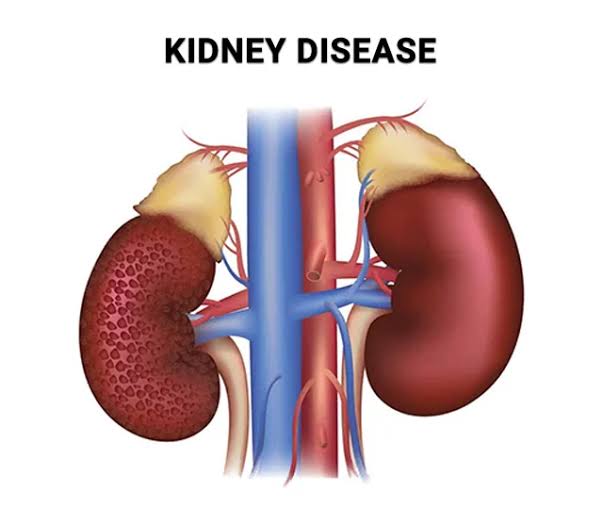Health Desk
18 May
Sandeep Dhand Ludhiana
Kidney disease, often termed chronic kidney disease (CKD), is a significant health issue affecting millions globally. This progressive condition can lead to kidney failure, requiring dialysis or a kidney transplant for survival. Understanding its causes, symptoms, and treatment options is crucial for managing and potentially preventing this debilitating disease.

The Role of the Kidneys
The kidneys are two bean-shaped organs located on either side of the spine, just below the rib cage. They perform several vital functions:
Filtering Blood: Removing waste products and excess fluids to form urine.
Balancing Electrolytes: Maintaining stable levels of essential minerals like sodium, potassium, and calcium.
Regulating Blood Pressure: Producing hormones that help control blood pressure.
Producing Red Blood Cells: Releasing erythropoietin, a hormone that stimulates red blood cell production.
Causes of Kidney Disease
Kidney disease can result from a variety of underlying conditions and factors, including:
- Diabetes: High blood sugar levels can damage the blood vessels in the kidneys over time.
- Hypertension (High Blood Pressure): Chronic high blood pressure can harm kidney function by putting extra strain on the blood vessels in the kidneys.
- Glomerulonephritis : Inflammation of the kidney’s filtering units (glomeruli) can impair their ability to filter waste.
- Polycystic Kidney Disease: A genetic disorder characterized by the growth of numerous cysts in the kidneys.
- Chronic Infections and Obstructions: Recurrent kidney infections (pyelonephritis) or urinary tract obstructions can lead to kidney damage.
- Autoimmune Diseases: Conditions like lupus can attack the kidneys.
Symptoms of Kidney Disease
Kidney disease often progresses silently, with symptoms appearing only in the later stages. Early detection is challenging, but some common signs include:
Fatigue: Decreased kidney function can lead to a buildup of toxins and impurities in the blood.
Swelling: Excess fluid can accumulate in tissues, causing swelling in the legs, ankles, feet, or face.
Changes in Urination : Symptoms might include increased frequency, dark-colored urine, or foamy urine.
Muscle Cramps: Electrolyte imbalances can lead to muscle cramps and twitches.
Shortness of Breath: Fluid buildup in the lungs can cause difficulty breathing.
Nausea and Vomiting: Accumulation of waste products in the blood can cause gastrointestinal symptoms.
Diagnosis of Kidney Disease
Diagnosing kidney disease typically involves a combination of blood and urine tests:
Blood Tests: Measuring levels of creatinine and urea in the blood helps assess kidney function. The glomerular filtration rate (GFR) is calculated from these levels to determine the stage of kidney disease.
Urine Tests: Checking for protein or blood in the urine can indicate kidney damage.
Imaging Tests: Ultrasounds or CT scans can reveal structural abnormalities in the kidneys.
Biopsy: In some cases, a small sample of kidney tissue is examined under a microscope to identify the cause of kidney disease.
Treatment Options
Treatment aims to slow the progression of kidney disease and manage symptoms. The approach varies based on the underlying cause and stage of the disease:
- Lifestyle Changes : Adopting a kidney-friendly diet low in sodium, potassium, and phosphorus can help. Maintaining a healthy weight, quitting smoking, and exercising regularly are also beneficial.
- Medications: Blood pressure medications (ACE inhibitors or ARBs), medications to control blood sugar, and drugs to lower cholesterol can help protect kidney function.
- Dialysis: In advanced stages (kidney failure), dialysis is required to perform the filtering functions of the kidneys. There are two main types:
(a) Hemodialysis: Blood is filtered using a machine.
( b) Peritoneal Dialysis: The lining of the abdomen (peritoneum) is used to filter blood inside the body.
- Kidney Transplant: A healthy kidney from a donor can replace the diseased kidney. This is often the best long-term solution for those with end-stage renal disease.
Preventing Kidney Disease
Preventative measures are crucial, especially for those at higher risk:
Regular Check-ups: Routine screenings for kidney function, especially if you have diabetes or hypertension.
Healthy Diet: Consuming a balanced diet rich in fruits, vegetables, whole grains, and lean proteins.
Hydration: Drinking plenty of water to help the kidneys flush out toxins.
Avoiding Overuse of Medications: Non-steroidal anti-inflammatory drugs (NSAIDs) and certain antibiotics can harm the kidneys if used excessively.
Conclusion
Kidney disease is a serious and often silent condition that requires awareness and proactive management. Early detection through regular medical check-ups, coupled with a healthy lifestyle, can significantly reduce the risk of developing kidney disease. For those diagnosed with CKD, a comprehensive treatment plan tailored to individual needs can help manage the disease and improve quality of life. As research continues, new treatments and strategies will emerge, offering hope for those affected by this challenging condition.